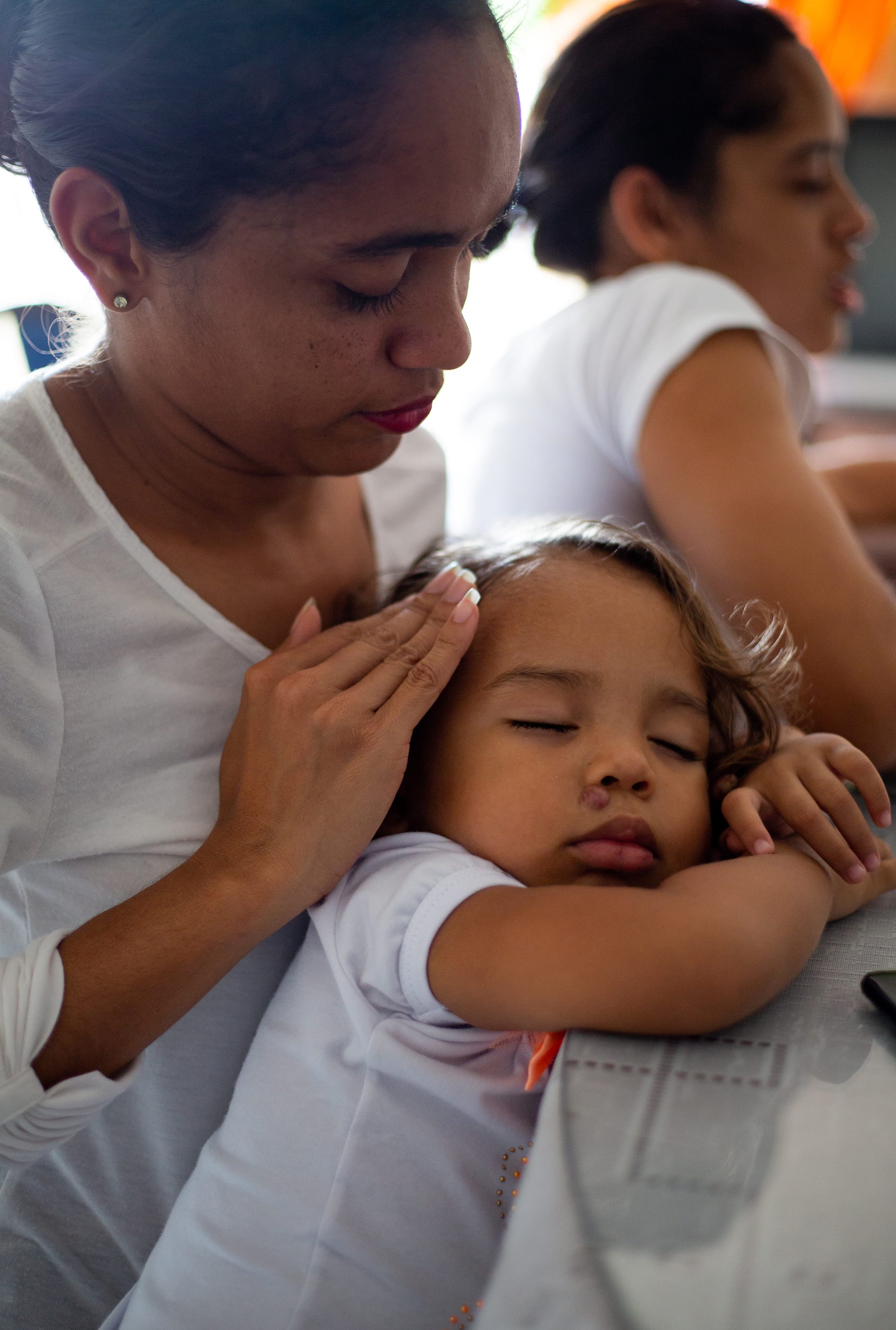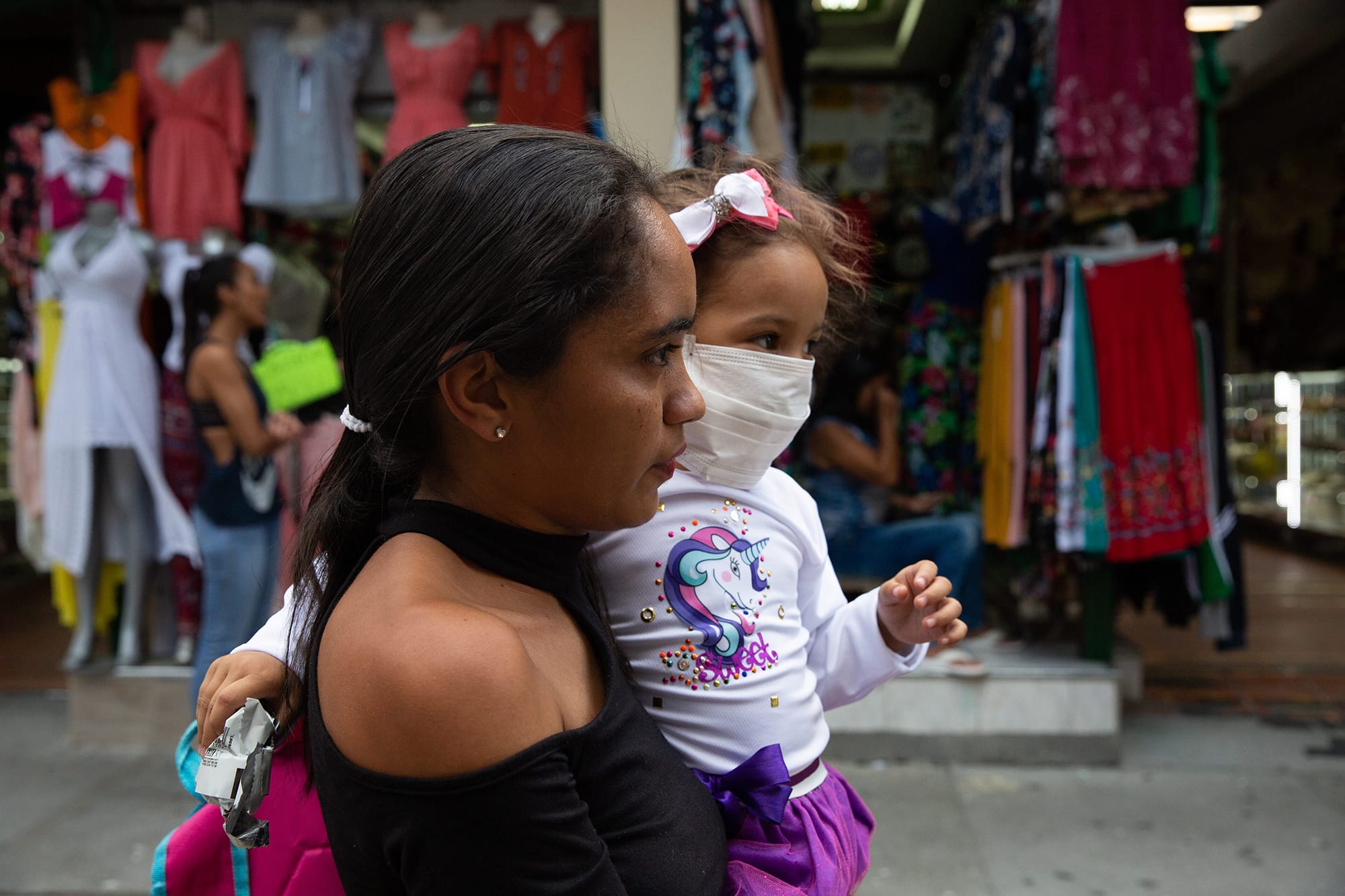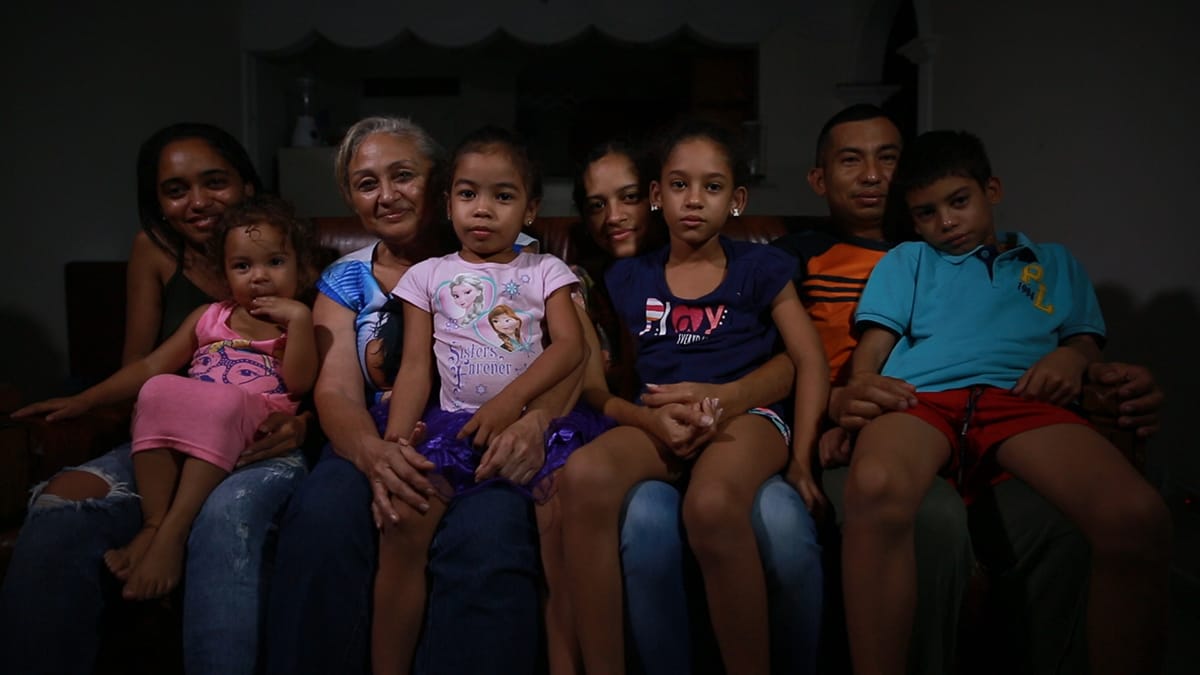Marbis Judith Verenzuela, 53, knew she had to go back. Her oldest daughter, Jorlis, was still in Venezuela. So last December, she traveled back from Colombia to save her family.
Jorlis, 29, had surgery to remove a brain tumor in 2012, but still experiences side effects from the operation. She had been suffering from convulsions for 30 days because she couldn’t get the medicine she needed to control her seizures, and had been staying in a hospital in Maracay. She couldn’t recognize her own children.
Marbis Judith did not know how sick her daughter was until she arrived in Maracay.
“They just told her I was fine and felt a little bad, but nothing too serious,” Jorlis said.
Still, the mother and daughter knew had to make the journey to Colombia, where she might have some hope for better care. So they got on a bus ito Cúcuta, where thousands of Venezuelans are crossing daily.
When the family got to Simón Bolívar International Bridge — the dividing line between the world they knew and the world awaiting — Jorlis collapsed.
“I thought I was going to lose my daughter at that moment,” Marbis Judith said. “I thought Jorlis was going to die.”
Two Colombian immigration agents shouted for someone to bring them a wheelchair. They allowed the family to cross into Colombia, even without papers. Marbis Judith grabbed her grandson and granddaughter, and rushed her family across the bridge to the Red Cross facility in Cúcuta.
At the Red Cross, they gave Jorlis medicine and treated her so that she could travel to Medellín. Now, she lives with her husband, her children, Marbis Judith, her younger sister and her two nieces in a two-bedroom apartment in Medellín. Jorlis says her children remind her to take her medicine every morning, in case she forgets.
Despite the hardship in fleeing to Colombia, the family felt they had no choice. When Venezuela’s economy collapsed in 2014, so did the health care system. Doctors fled the country, seeking better jobs in other countries. Shelves that were once stocked with medicines sat empty. In March, blackouts in the country led to as many as 70 deaths as hospitals lost power for days.
Marbis Judith and her family had heard that Medellín had reputable doctors who may be able to help. With four family members suffering from chronic illness, they felt like this was their only option, and the family came to be among the more than a million Venezuelans now living in Colombia, and among the 80,380 migrants that arrived without documentation.
“In this Venezuela– which used to be so rich– that kids are dying from a lack of medicine?” said Jorlis’ sister, Marbis Georgina, who is 28. “That you get to a hospital and they don’t have alcohol? That’s a basic thing that a hospital should have. Or some cotton? It’s surprising.”
The family sits in their new home in downtown Medellín. The previous owner donated money so they could have furniture. They owned nothing except hope when they arrived. Outside, the sounds of the city roar on, with a salesperson’s boisterous announcements intermingling with the hums of cars.

Judy falls asleep on her mother’s lap as the sisters talk. Judy is named after her grandmother, because Marbis Judith had cancer at the time of her birth.
Jorlis isn’t the only family member whose health concerns pushed them to migrate. Marbis Georgina’s daughter Judy, 2 years old, has a tumor on the right side of her face, above her lip. It developed when she was 15 days old, and she has taken medication for it since then. The small girl sits in her mother’s lap, resting her head against the table as she dozes off.
Judy’s tumor requires treatment every 15 days. Back home, her mother used to make the seven hour journey to Caracas twice a month to get her nitrogen treatment. The price varied every two hours, and became more expensive as doctors began fleeing the country.
Eventually, doctors presented Marbis Georgina with a solution: they could perform three separate surgeries on Judy to remove the tumor and reconstruct her lip. Each would cost USD $1,500.
Since inflation in Venezuela is increasing drastically every day, Marbis Georgina had to make a decision, and with that, she decided to move to Medellín with her daughters.
Making it in Medellín has not been easy. The family struggles to pay for their medical treatments. Judy missed her last treatment for her tumor, because the family couldn’t afford it.
“It’s frustrating,” Marbis Georgina said. “I came with the hope of returning to my country, with my daughter healthy.”
Colombians in the neighborhood have tried to help the family when they can. Alba Luz Belez, a neighbor, has helped buy clothes for the children. Other people help buy medicines. But many Colombians are unable to help.
“Mom and Dad make the minimum wage and they have to support their children with their minimum wage and pay for the rent and food,” said Luz about Colombians who are unable to help. “They just can’t, even if they have a beautiful heart and the best of intentions to help people.”
The remnants of cooking are left in the Verenzuela’s kitchen. Pots and bowls dry. Halved plantains sit on the counter. The day before they had prepared bollitos venezolanos, a cornflour roll filled with beef.
The family sells food in Parque Bolívar every day. Bollitos sell for $1,000 Colombian pesos, roughly 33 cents in U.S. dollars. The family of eight depends on these day-to-day sales to pay for their rent, food and medicine.
“There’s not a moment when you can say, ‘I’m going to take two hours off to rest,’” Marbis Georgina says. “Here, we work everyday because the rent doesn’t stop. Our expenses don’t stop. The bills keep coming.”
The family works together to get by. While Marbis Judith and Marbis Georgina sell in the park, Jorlis takes care of the children.

Marbis Georgina Verenzuela takes her daughter Judy to a clinic in Medellín to learn about possible treatments for her tumor. Judy wears a mask because she was sick earlier in the week, and because of the city’s air pollution.
“We’ve been here as a family through these difficult times,” Marbis Georgina said.
Marbis Judith’s husband and son are the only members of the family that still live in Calabozo. Marbis Georgina says this is difficult, because it’s the first time in her life she has been separated from her brother.
Marbis Judith is the driving force that has kept the family moving. Marbis Georgina says that her mother has supported them through the move, through their health issues, through everything. Even when she had health issues of her own.
“I’m running for my life,” Marbis Judith said. “Running for my life, for my grandchildren’s lives, for my family, because I’m a grandmother to four children. And that keeps me going. Perhaps it even raised me out of death itself.”
Venezuelan politicians had promised public health care would be available for everyone. But as the socialist government has collapsed, so too did the healthcare system. Many Venezuelans have moved to other countries seeking care. For those too sick to relocate, family members sometimes travel to Colombia to purchase medicine and supplies.
Colombia has both a public and private health care system, similar to that of the United States. The private system is more efficient, and provides the best quality health care in the country. The public system is free and available, but often has long wait times.
Colombian Healthcare
Analyzing Coverage Options
FREE
for qualifying residents*
The System for the Selection of Beneficiaries of Social Programs (Sisbén) assigns Colombian residents to free government-subsidized health and social programs based on need.
Residents who qualify are eligible to receive free basic healthcare coverage through government contracts established with private insurers. Most health subsidies are received by poverty-stricken Colombians, but a large influx of documented Venezuelan immigrants has strained an already-struggling system.
Like the Verenzuela family, most Venezuelan migrants are unable to afford private insurance and many face the additional challenge of being undocumented and ineligible for Sisbén coverage. To be considered for free healthcare access under the Sisben, they must be issued a Special Permit of Permanence (PEP).
Starting at
12.5%
of Gross Monthly Income
The Colombian government’s National Health Superintendent is responsible for selecting and recognizing eligible private insurance organizations based on capital, and coverage to participate in the healthcare system. These recognized insurers are known as Health Promoting Entities (EPS) and are able to sell basic and premium healthcare packages to the public.
A basic coverage plan through an EPS comes at a government-defined base price of 12.5% of one’s gross monthly income. While most of Colombia’s population affiliates itself with the basic coverage option, most EPS’s offer additional coverage and priority access to care at a higher cost.
Those who can afford the higher premiums have the option to buy a complementary plan. This gives them access to specialist appointments without a referral, along with other priority access perks. Most EPS’s also offer prepaid medicine plans at even higher premiums that come with access to the highest priority of medical care and service available in Colombia.
With the influx of Venezuelan migrants to Colombia, the government decided to create a program that allowed documented migrants to work. They introduced the Permiso Especial de Permanencia (PEP) in August 2017, which allows Venezuelans to work and receive public benefits for up to two years. If you have the PEP, you are allowed access to the public health care system in Colombia.
After three rounds of PEP applications, 415, 298 Venezuelan migrants are registered to receive public health care.
Marbis Georgina’s daughter Alma has epilepsy. Since they are undocumented, they do not qualify for the PEP until they have passports. Since they are unable to benefit from the country’s public healthcare system, their only other option is private healthcare – which is expensive.
The health care crisis in Venezuela is also affecting doctors, many of whom have found themselves fleeing for better economic opportunities. One of them is Jorge Orozco, 40, a Venezuelan doctor of internal medicine who now lives in Medellín.
“I didn’t come to Colombia to make myself rich or anything. I just came to look for their health.”
Orozco cooks Venezuelan desserts and arepas in his apartment, which he then sells to customers that put in orders. He says he used to sell in La Floresta park, but business wasn’t as good.
Orozco can’t practice medicine in Medellín, because he doesn’t have his transcript or diploma. He says that because Venezuela doesn’t want its doctors leaving the country, his university won’t release his school records. Without those, he can’t practice medicine in his new home.
However, he has found a few patients he can help through house calls. He has seven patients that he makes home visits for, that he gives advice to for a fee.
“I go to their homes,” Orozco said. “Sometimes they call me and say they don’t even have 1,000 pesos to afford the visit, so I find a way to help them over the phone.”
He hopes to have his records from his medical school come in, so that he can practice. But for now, he has to find a way to send money to his wife and son, who are still in Venezuela.
Orozco is facing the opposite side of the larger problem: when a healthcare system falls apart, providers and patients both suffer.
“I didn’t come to Colombia to make myself rich or anything,” Marbis Georgina said. “I just came to look for their health. The only thing I ask God, every day of my life, is that my girls are fine, that my sister is fine.”
The family comes together for dinner every night, after the children come home from school and the adults finish working. Their table doesn’t have enough seats for everyone, so they eat in two cycles – children first, then adults.
Tonight, Alma is suffering from epileptic symptoms. She is taking medicine and heading to sleep. The other children will soon follow, and the family will split between the four mattresses in the house.
Marbis Georgina still has hope that her children will be raised in Venezuela. She says she wants her children to get to know that beautiful country, a country she believes is the best in the world.
The children, however, feel differently. Jorlis’ daughter, Maria, still remembers the hunger.
“The other day, I was joking around with her and I told her, ‘Sweetie, let’s pack our bags, we’re going back to Venezuela this weekend. Let’s go.,” Marbis Georgina said.
Her niece told her no – she didn’t want to keep eating beans and lentils, like she had to back home.
“I eat well here,” her niece said. “But I’m hungry over there.”


Left: Marbis Georgina and Jorlis prepare arepas for the family dinner, while Maria and Alma play behind them. Right: Marbis Georgina gives her daughter Alma medicine for her epileptic symptoms. She says the medicine tends to make Alma sleepy.
The family still struggles to treat their medical issues, due to the lack of money and status within Colombia. The government is only accepting PEP applications if Venezuelans have a passport and arrived in the country before Dec. 17. If Marbis Georgina can get the proper documentation for her children, they will have access to Colombia’s public health care system.
There won’t be another round of PEP applications until July, said Toni Vitola, a representative from ColVenz, a local NGO that partners with the United Nations and other agencies to make sure Venezuelans know what resources they have in their new home.
“Escapando por mi vida, escapando por mi vida y por la de mis nietas, la de mi familia. Porque soy abuela de cuatro niños, y para mí eso me sustenta. Eso me levantó quizás de la misma muerte.”
Without PEP, Jorlis, Eucletus and their children can’t receive most government assistance. Instead, they have to seek care from nongovernmental organizations, and can only visit a Colombian doctor for emergency care.
For now, undocumented Colombians with health issues are stuck in a state of limbo.
“I wish that the government, the Colombian government, would help more with health cases,” Marbis Georgina said. “Maybe with foundations, because we don’t come to stay in Colombia. We have the hope that our country is going to resolve itself and that we are going to have a beautiful Venezuela, like before.”
